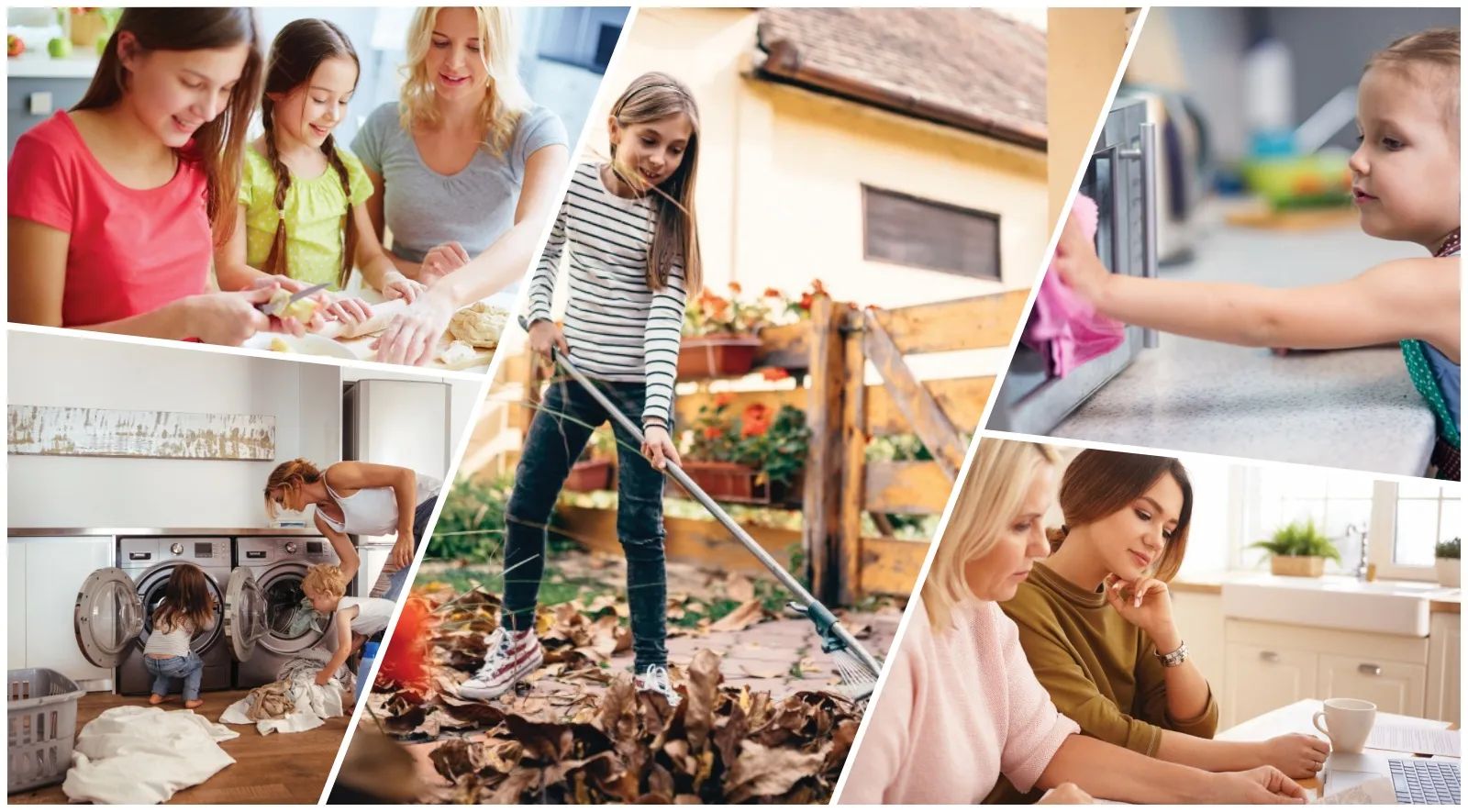
Essential Life Skills at Every Age & Stage
January 2021 | by rebecca stewart
From the moment our littles start toddling around, we entreat them to be gentle with others, be cautious with specials, and then sing clean-up songs that launch the lessons of picking up after oneself. You might not have realized it at the time, but it was the foundation upon which all other life skills would be built.
There are lessons to be learned in every age and stage, skills to be taught that will ultimately prepare our precious beings for life out in the world. Along the way, before they leave the nest, these skills will serve our children at home, in the classroom, during conflicts with friends, in their extracurriculars, and eventually, on the job. The life skills that we need to fill our children's toolboxes extend far beyond the tangible; we must also equip them with - perhaps harder to grasp - emotional tools. And so, we're breaking it down, looking at what life skills are appropriate to be taught at any given age, followed by Dustin Lehman, MS, LCPC, LMFT at Northwest Counseling Center, explaining the nuances of developing emotional tools.
Ages 2 & 3: Baby Steps
- Help put toys away
- Dress himself (with some assistance)
- Put dirty clothes in the hamper
- Allow for helping where appropriate (like helping set – parts – of the table)
- Brush teeth and wash face with assistance
Ages 4 & 5: Safety First
With preschool and kindergarten looming, safety skills are a top priority.
- Know full name, address, and phone number for their grown-up(s)
- How to make an emergency call
Beyond that…
- Perform simple chores like dusting easy-to-reach spots and clearing their place after meals
- Feed pets
- Identify money denominations and understand the very basic concept of how money is used
- Brush teeth, comb hair, and wash face independently
- Laundry basics- putting clean clothes away, putting dirty clothes in the hamper
- Choose their outfit of the day
- The early stages of Time Management: create a picture schedule, practice waiting (for example, if they want something extra at the store or to go someplace fun)
Ages 6 & 7: Now We're Cookin'
Let's start learning basic kitchen/meal skills!
- Mix and stir, cut with a dull knife
- Make a basic meal, such as a sandwich
- Help put groceries away
- Help with the dishes
Additionally…
- Safely use basic household cleaners
- Straighten up the bathroom after using it
- Bathe unsupervised (please note: children younger than age 6 should NOT be left unattended in the bathtub)
- Time Management, phase II: put a timer in play when they have a task that needs completing, consider developing a reward system if they complete said task(s) ahead of or on-time.
Ages 8 & 9: You Are So Beautiful to Me
At this point, children should take pride in their belongings and be able to care for them properly.
- Fold and put away their clothes
- Learn simple sewing
- Be aware of proper care for their toys and equipment (e.g., filling bike tires and general care; gone should be the days of cutting Barbie's hair or marking up walls)
Also…
- Stay on top of personal hygiene without being told (probably they'll need to be reminded now and again…)
- How to order at a restaurant
- Use a broom and dustpan properly (while we're at it, let's learn the ways of the mop)
- Read a recipe and prepare a simple meal
- Help create a grocery list
- Count and make change
- Take out the trash
- Time Management, phase III: Allow your child the consequences of poorly managing their time. Don't swoop in to the rescue if they blow off an assignment or a task at home. While we can certainly teach grace, we also must teach accountability.
Ages 10-13: Independently Speaking
Literally...As silly as we might think it sounds, if you haven't already, be planting the seeds for proper phone call making and receiving etiquette. With email, texting, and Snapchat, the how-to's on phone calls can be a real challenge for our young people.
- Stay home alone (there are MANY factors to consider here, check out this article for a breakdown: https://simplyfamilymagazine.com/home-alone-how-to-tell-if-your-child-is-ready)
- Make purchases at the store by themselves
- Change their own bedding
- Cleaning the bathroom 101 (this isn't something they'll magically know how to do properly, so walk them through, piece by grody, disgusting piece.)
- How to read a label
- Use the washing machine and dryer (lest we forget the necessity of sorting our clothes – don't make them learn the hard way that reds wreak havoc on whites)
- Plan and prepare a meal with several ingredients (It would be lovely if you started compiling favorite recipes to be gifted at graduation)
- Use the oven to broil or bake foods
- Iron clothes
- Use basic hand tools
- Look after younger siblings or neighbors
- Find their voice and learn how to self-advocate with teachers and coaches
- Time Management, phase IV: Help them predict and plan for how long certain tasks will take (e.g., that big book report or project), put a schedule in place to accomplish said task. Prioritize their to-do list.
Ages 14-18: It's Getting Serious Now
By 14, they should have mastered all previous skills and now…
- Complete more challenging cleaning and maintenance tasks, like plunging a toilet, cleaning the stove, mowing the lawn, and unclogging drains.
- Fill a car with gas (be sure to emphasize the correct gas for the vehicle they are fueling), check the oil, add air to and change a tire.
- Read and understand medicine labels and dosages
- Create and maintain a calendar
- Beginning stages of understanding money management
- Interview for and earn a job
Which includes a whole subsection…
- Punctuality (Emphasis on being early is better than on time)
- If you're going to do something, do it right, do it well, do it to the very best of your ability
- Respect- of the place of business, its rules and guidelines, the equipment, the employer, co-workers, and customers; for the job you were hired to do
- Show initiative- meaning, if you see that something needs to be done, then do it
Young Adults: On the Cusp of Launching
- Make regular doctor/dentist/eye appointments (have them start practicing before they've taken flight and talk insurance)
- Have a basic understanding of finances and be able to manage their bank account, pay a bill, and responsibly use a credit card
- Teach them how to build their budget
- Understand basic contracts, like an apartment or car lease (and questions to ask)
- Schedule oil changes and basic car maintenance
- Personal accountability/time management
- Identify what being a good roommate/housemate looks and sounds like
- Transportation (personal, public, shared, Uber)
- What to expect when purchasing a vehicle
- Dealing with illness away from mom's tender care (how to treat their symptoms, when to go to the doctor, communicating if this causes missed classes or they need to call in sick to work)
Certainly, some things didn't make the list, and honestly, when we look at it mapped out like this, it can feel incredibly overwhelming. Just remember, it doesn't all happen at once; there will be missteps along the way but isn't that where the best learning happens? Ultimately: Show up. Love them. Guide them. Make accountability a priority. Fill their toolbox full while knowing you're just a phone call away.
Source: FamilyEducation.com
Originally printed in the January 2021 issue of Simply Local Magazine
Never miss an issue, check out SLM's digital editions here!





